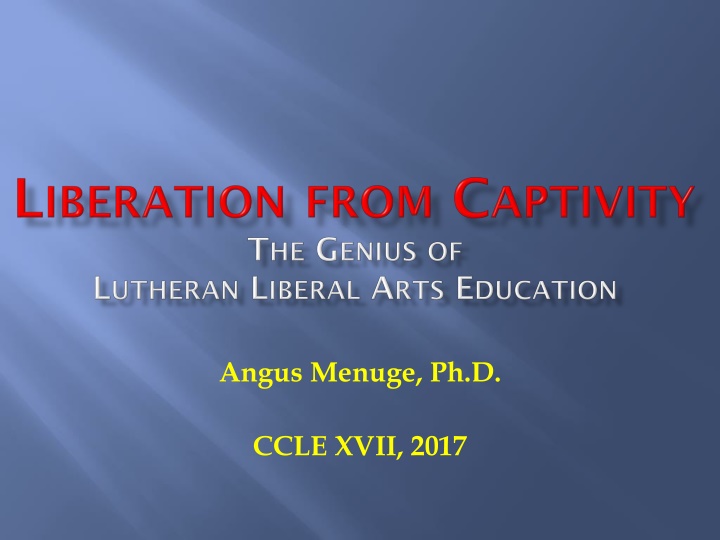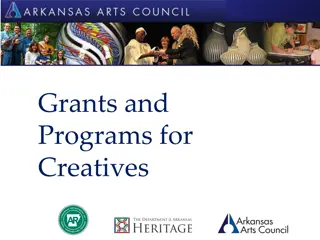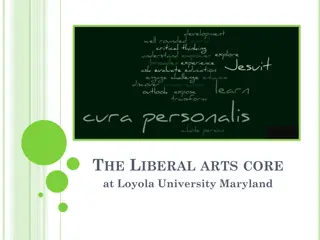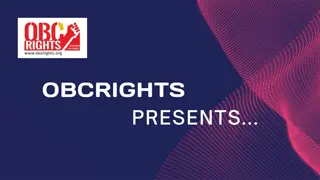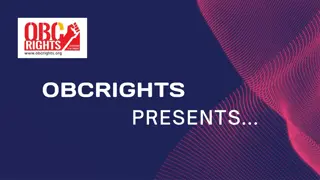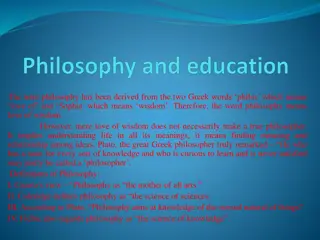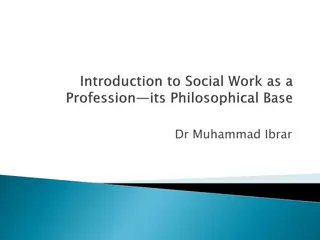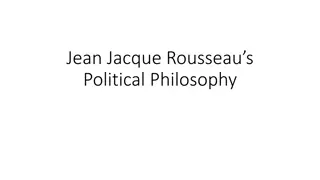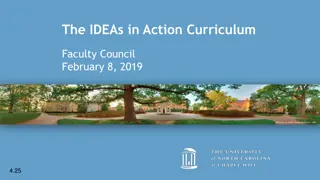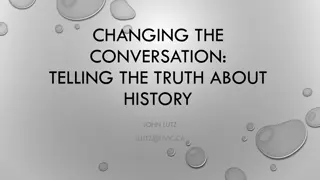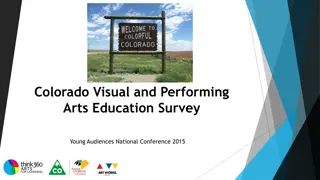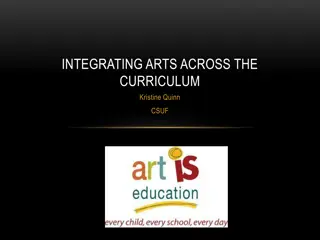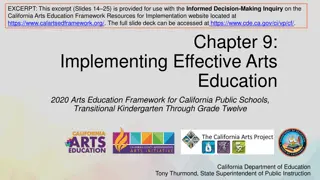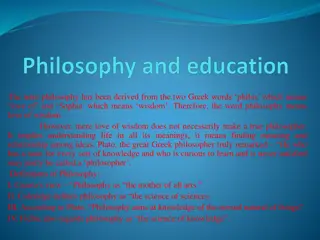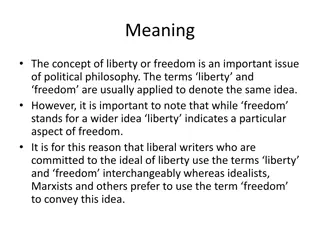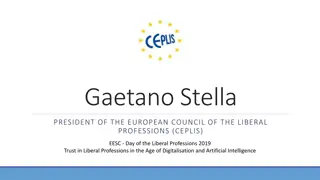Philosophy of Liberal Arts Education and Freedom
Classical education programs at CUW emphasize a philosophy major with a focus on primary sources, history of philosophy, worldviews, bioethics, and apologetics. This education model seeks to equip individuals for freedom, drawing on the roots of liberal education in the concept of liberty as a means to live out conscience and do what is right. The discussion delves into the origins of liberal education, the distinction between liberty and license, and the interconnectedness of freedom and conscience in both thought and action. The narrative explores the idea of captivity in various forms and examines how a Lutheran liberal arts education can play a role in setting individuals free from oppressive constraints.
Download Presentation

Please find below an Image/Link to download the presentation.
The content on the website is provided AS IS for your information and personal use only. It may not be sold, licensed, or shared on other websites without obtaining consent from the author.If you encounter any issues during the download, it is possible that the publisher has removed the file from their server.
You are allowed to download the files provided on this website for personal or commercial use, subject to the condition that they are used lawfully. All files are the property of their respective owners.
The content on the website is provided AS IS for your information and personal use only. It may not be sold, licensed, or shared on other websites without obtaining consent from the author.
E N D
Presentation Transcript
Angus Menuge, Ph.D. CCLE XVII, 2017
Classical education program at CUW. Has begun! See latest fliers! Philosophy major at CUW. An exciting, classically oriented major Emphasis on primary sources, history of philosophy Special focus on Worldviews, Bioethics, Apologetics International Academy of Apologetics July 10-21, 2018, Strasbourg France http://www.apologeticsacademy.eu/
31So Jesus said to the Jews who had believed him, If you abide in my word, you are truly my disciples, 32and you will know the truth, and the truth will set you free. 33They answered him, We are offspring of Abraham and have never been enslaved to anyone. How is it that you say, You will become free ? 34Jesus answered them, Truly, truly, I say to you, everyone who practices sin is a slave to sin. 35The slave does not remain in the house forever; the son remains forever. 36So if the Son sets you free, you will be free indeed. (John 8: 31-36)
The word liberal derives from the Latin word for freedom [libertas]. In the Greek democracy and the Roman Republic, a liberal education was one that formed and equipped free citizens, those whose deliberations and decisions would guide the city. It was opposed to a servile education, one designed for slaves the same sort of vocational training often clamored for today. It is highly significant that the Reformation schools rejected the model of servile education and instead provided for all classes of people, and for girls as well as boys, a liberal education designed to equip human beings for freedom. --Gene Edward Veith, Vocation in Education in Learning at the Foot of the Cross, eds. Joel D. Heck and Angus J. L. Menuge (Austin, TX: Concordia University Press, 2011), 105.
Liberty grants us the freedom to live out our conscience in thought and actions. Not the same as license (licentia). Liberty is freedom to do what is right, not what we like. Conscience is not in the business of licensing us to do as we please . Rather, conscience has rights because it has duties. --Robert P. George, Conscience and its Enemies (Wilmington, DE: ISI Books, 2013), 112.
We value liberty as freedom to do things (to live by our conscience). But we also value freedom from oppressive captivity from various kinds of slavery. So what kinds of captivity are there? And how can a Lutheran liberal arts education set us free?
A. Socio-political: We are denied the freedoms of citizens e.g. by propaganda. Philosophical: We are ensnared by philosophies that hide the truth about God and His world. Sin: We are enslaved to an inherited sickness that prevents human flourishing. B. C.
State education serves the interests of the state. Pupils are a captive audience. Unless educational alternatives are offered, the state has a monopoly Instruction in how to think may become indoctrination in what to think Citizens do not learn the data and arguments on all sides of an issue, so cannot make informed decisions Evolution Multi-culturalism Environmentalism Gender theory and sex education
I believe man is happierif he has the free-born mind. But I doubt whether he can have this without economic independence, which the new society is abolishing. For economic independence allows an education not controlled by Government; and in adult life it is the man who needs, and asks, nothing of the Government who can criticize its acts and snap his fingers at its ideology . C. S. Lewis, Willing Slaves of the Welfare State, The Observer, July 20th, 1958.
Classical education provides students with tools to make an independent evaluation. History: data about other times Art and literature: imagining other possibilities Philosophy: understanding other worldviews Logic: testing arguments, comparing alternatives Propaganda can be resisted if citizens have: A) a counter-perspective B) critical distance
Classical education emphasizes permanent values that transcend the pragmatic/utilitarian values of the state. These help citizens: go beyond cultural relativism recognize human rights and dignity resist ideologies like communism and fascism
Without informed citizens, democracy devolves into a tyranny of the majority that is easily manipulated In a democracy, our leaders are our servants and representatives That is meaningful only if citizens: know their rights hold leaders accountable to an independent standard In the US, this requires knowledge of the content and purpose of the Constitution
One cannot help having a philosophy. It will be either conscious or subconscious. It will be either good or bad. The unexamined life is not worth living (Socrates) Christians must examine whether their assumptions and principles are compatible with a biblical worldview
See to it that no one takes you captive by philosophy and empty deceit, according to human tradition, according to the elemental spirits of the world, and not according to Christ. (Colossians 2:8) St. Paul is not anti-philosophy. He uses philosophy in his response to epicureans and stoics (Acts 17). But Christian philosophy must be according to Christ.
We can be deceived by appearances The shadows and echoes of our cave: Revisionist history Biased secondary sources Textbooks that assume (without stating or arguing for) materialism, Marxism, gender theory Recycled myths (e.g. about Galileo) Urban legends Slogans, euphemism and pejorative
The very power of [an unstated philosophy in a textbook] depends on the fact that they are dealing with a [student who] has no notion that ethics, theology, and politics are all at stake. It is not a theory they put into his mind, but an assumption, which ten years hence, its origin forgotten and its presence unconscious, will condition him to take one side in a controversy which he has never recognized as a controversy at all. C. S. Lewis, The Abolition of Man (New York: Macmillan, 1955), 16-17. E.g. if the textbook assumes that humans are simply material entities not made in the image of God, or that all moral judgments are merely expressions of emotion.
The man who has no tincture of philosophy goes through life imprisoned in the prejudices derived from common sense, from the habitual beliefs of his age or nation, and from convictions which have grown up in his mind without the cooperation or consent of his deliberate reason. Bertrand Russell, The Problems of Philosophy.
Modernism: The project of accounting for understanding starting within the human mind and relying solely on its faculties of reason and experience. But can we get beyond our ideas to the way the world really is? A road to skepticism
Whatever we imagine is finite. Therefore there is no idea or conception of any thing we can call infinite. And so the name of God is used that we may honor him and not to make us conceive him, for he is incomprehensible and his greatness and power are inconceivable. Thomas Hobbes, Of the Consequence or Train of Imaginations, Leviathan (New York: Pearson Longman, 2008), 13. For Hobbes, God is inconceivable! 21
We can know the way something appears e.g. the appearance of an apple But we cannot know the thing itself: a supposition of [one] knows not what support of such qualities which are capable of producing simple ideas in us John Locke, An Essay Concerning Human Understanding (London: Fontana Collins, 1973), 185. 23
For my part, when I enter most intimately into what I call myself, I always stumble on some particular perception or other I never catch myself at any time without a perception and can never observe anything but the perception. David Hume, Of Personal Identity, A Treatise of Human Nature (New York: Penguin Books, 1984), 300. 25
Trapped in our own ideas, modernism leads to the conclusion that we cannot know reality. We lose access to: The transcendent (Hobbes) The real world (Locke) Ourselves (Hume) 26
Postmodernism seems to offer liberation from modernism s prisons Postmodernists claim: There are no grand stories, true for all; there are only small stories for individuals or groups So you are free to embrace a story that affirms the external world, yourself, miracles and God! But there is a catch: What we know is relative to the language community we belong to
Postmodernists claim: We cannot access the world as it is, but only the way we represent it in language. What we know is the way we talk of the world, not the way the world really is. we are on the inside of language and cannot get outside of it to know the real world. R. Scott Smith, Truth and the New Kind of Christian (Wheaton, IL: Crossway Books, 2005), 95. 28
We cannot get at the meaning of an author of a text; instead our interpretations tell us more about ourselves than about what the author meant. What would that imply for Scripture? It would imply that we cannot know what God meant when he gave us His special revelation, and therefore its meaning is up to us. R. Scott Smith, Truth and the New Kind of Christian (Wheaton, IL: Crossway Books, 2005), 135. 29
To be ignorant and simple now--not to be able to meet the enemies on their own ground-- would be to throw down our weapons, and to betray our uneducated brethren who have, under God, no defense but us against the intellectual attacks of the heathen. Good philosophy must exist, if for no other reason, because bad philosophy needs to be answered. C. S. Lewis, "Learning in War-Time," in The Weight of Glory and Other Addresses (New York: Macmillan, 1965), 27-28.
God created us to know: His transcendent attributes (general revelation); the world He made (required for us to be stewards); Him (special revelation) the person and work of Jesus Christ recorded in Holy Scripture God wants to set us free from the prisons that make it impossible to know Him 31
And I must not think that I perceive the infinite not through a true idea, but rather only through the negation of the finite . For on the contrary I manifestly understand that there is more reality in an infinite substance than there is in a finite one, and therefore that the perception of the infinite is in me in some mode prior to the perception of the finite, that is, that the perception of God is in me in some mode prior to the perception of me myself. Ren Descartes, Third Meditation, in Meditations on First Philosophy (Notre Dame, IN: University of Notre Dame Press, 1990), 137, 139. 32
For how would I understand that I doubt and that I desire, that is that something is lacking in me and that I am not completely perfect, if there were no idea of a more perfect being in me from whose comparison I might recognize my defects? Ren Descartes, Third Meditation, 139. 33
Mans greatness comes from knowing he is wretched. Blaise Pascal, Pens es, #114 Like deposed kings, we know we fall short of a perfect standard, God. 34
an infants cognitive faculties normally develop with a number of conceptual holes that have particular shapes. One of these holes is a god- shaped hole. Justin Barrett, Born Believers: The Science of Children s Religious Belief (New York: Free Press, 2012), 9. Belief in a superhuman agent with superpower superknowledge, superperception and immortality is a natural trait (19) 35
God, an actually infinite, omnipotent being can become man (and, He did). In the person of Jesus Christ, the God-man, the infinite is present in the finite. We have solid evidence that Christ is God in the historical case for the Resurrection. 36
We are by nature unable to know God personally. But Christ bridges the gap between God and humanity and makes God known to us. The LORD sets the prisoners free; the LORD opens the eyes of the blind. (Psalm 146: 7-8) The saving actions of this man are the works of God We see who God is in the person and work of Christ Through Christ, we know God personally. 37
Philip said to him, Lord, show us the Father, and it is enough for us. 9Jesus said to him, Have I been with you so long, and you still do not know me, Philip? Whoever has seen me has seen the Father (John 14: 8-9) 38
Our problems are not just cognitive. We are by nature enemies of God, asserting our will against His. For the mind that is set on the flesh is hostile to God, for it does not submit to God's law; indeed, it cannot. (Romans 8: 7)
A pagan picture of the natural man as enslaved by his own insatiable and conflicting desires: to the speaker who avers that it pays this man to be unjust he is affirming that it profits him to feast and make strong the multifarious beast and the lion, but to starve the man and so enfeeble him that he can be pulled about whithersoever either of the others drag him Plato, Republic, Bk IX, 588e-589a. Note: the lion is the spirited element the man (reason) must train to bring his desires (the multifarious beast) under control.
Gollum is obsessed withpossessing the Ring. His selfishness is so self-devouring that he almost has no self left . It is the Ring that is now the Precious, and Gollum has lost his value. He has become its slave, and it has become his master. Peter Kreeft, The Philosophy of Tolkien: The Worldview Behind The Lord of the Rings (San Francisco, CA: Ignatius Press, 2005), 110.
But he does not have the full Truth: Developing self-control by cultivating virtue can contain the beast, and help people manage in civil society But we need the beast to be killed We cannot make ourselves righteous before God We need an external savior who fulfills the Law s demands and atones for our failure to do so
We know that our oldself was crucified with [Christ] in order that the body of sin might be brought to nothing, so that we would no longer be enslaved to sin. For one who has died has been set free from sin. Now if we have died with Christ, we believe that we will also live with him. (Romans 6: 6-8) For you have died, and your life is hidden with Christ in God put on the new self, which is being renewed in knowledge after the image of its creator. (Colossians 3: 3, 10)
Where do we die to self? Where does the new man in Christ appear? Where do we find the freedom of self-forgetfulness? One answer: In our vocations: God at work in us. Then Jesus told his disciples, "If anyone would come after me, let him deny himself and take up his cross and follow me. For whoever would save his life will lose it, but whoever loses his life for my sake will find it. For what will it profit a man if he gains the whole world and forfeits his soul? Or what shall a man give in return for his soul? (Matthew 16: 24-26)
Our vocations require us to love and serve neighbor. Our old sinful man resists, but our office compels us. This kills the old man so that the new person in Christ arises: we are set free for self-forgetful service. How many times have we found joy in doing something we were initially made to do? The Christian is crucified by the law in his vocation, under the earthly government; and he arises through the gospel, in the church under the spiritual government. Gustaf Wingren, Luther on Vocation, trans. Carl C. Rasmussen (Evansville, IN: Ballast Press, 1999), 30.
A Lutheran liberal arts education aims to set students free to know the Truth about God, the human condition and civilized society. It promotes: Free citizens: informed, independent social participants Free thinkers: not captive to worldly philosophies Free Christians: set free to serve in their vocation
